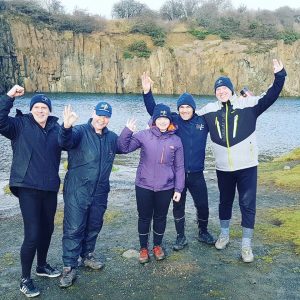Meet our latest Divemasters Trained by Colin Irvine over a season to ensure they are good Divemasters. If you would like to take this course and train with an authorized Padi TecRec dive centre that's going places please contact me.

Who should take this course
The PADI Divemaster course is your first level of professional training. Working closely with a PADI Instructor, you’ll fine-tune your dive skills, like perfecting the effortless hover, and refine your rescue skills so you anticipate and easily solve common problems. You’ll gain dive knowledge, management and supervision abilities so you become a role model to divers everywhere.
As a PADI Divemaster, you’ll lead others as you supervise scuba diving activities and assist with diver training. Whether you want to work at a faraway dive destination or close to home at a local dive shop, the adventure of a lifetime awaits you. PADI Divemasters are respected dive professionals who are aligned with the largest and most respected dive organization in the world – PADI.
PADI Rescue Divers who are at least 18 years old may enroll in the PADI Divemaster course. You also need to have:
-
Emergency First Response Primary and Secondary Care (CPR and First Aid) training within the past 24 months.
-
A medical statement signed by a physician within the last 12 months.
-
At least 40 logged dives to begin the course and 60 dives to earn certification.
whaT YOU WILL LEARN
The PADI Divemaster course teaches you to be a leader and take charge of dive activities. Through knowledge development sessions, waterskills exercises and workshops, and hands-on practical assessment, you develop the skills to organize and direct a variety of scuba diving activities. Topics and practical workshops include:
-
The role and characteristics of the PADI Divemaster
-
Supervising dive activities and assisting with student divers
-
Diver safety and risk management
-
Divemaster conducted programs and specialized skills
-
Business of diving and your career
-
Awareness of the dive environment
-
Dive setup and management
-
Mapping an open water site
-
Conducting dive briefings
-
Organizing a search and recovery project and a deep dive
-
Conducting a scuba review and skin diver course
-
Assisting with Discover Scuba Diving and leading Discover Local Diving programs
Your instructor may also offer the PADI Deep Diver and Search and Recovery Diver specialty diver courses along with your divemaster training to help you meet all requirements and to broaden your abilities.
HOW CAN YOU START LEARNING NOW
Sign up for Divemaster Online – PADI’s eLearning option – to start now. You can work through eight knowledge development sections using a web-based system that lets you learn at your own pace. You also have access to an online version of the Divemaster Manual for reference during and after the course.
Another option is to study by reading the Divemaster Manual and watching the Divemaster Video (a book and DVD package). Contact Scuba ts to enroll in the course and advice on how to order your Divemaster Crew-Pak, which also includes other reference materials – like the PADI Instructor Manual and The Encyclopedia of Recreational Diving– that you’ll need during the course.
Consider taking Dive Theory Online, another PADI eLearning® program, that takes you step-by-step through dive physics, physiology, skills, equipment and environment, plus a Recreational Dive Planner (RDP) review. By successfully completing Dive Theory Online, you can get credit for half of the Divemaster Final Exam.
Your PADI Instructor can explain how this works when you meet to schedule knowledge review sessions along with your waterskills exercises, workshops and practical assessments.
What Scuba gear do i need
As a dive professional, you’ll want to have all your basic scuba equipment, including a BCD,Regs, 2 x Tanks, Dive computer, a Dive knife, and at least two surface signalling devices. During practical skills exercises, like underwater mapping and search and recovery, you’ll use a compass, floats, marker buoys, lift bags and slates. If you need advice please ask Colin at Scuba Ts.
Advice before taking the course
If you are thinking of taking this course there s a few things you should know before you start. Firstly I am talking about taking this in Scotland, it will be hard work with long days with early starts and late finishes. You will be required to be of a decent fitness for lifting tanks, weights assisting students with equipment and sometimes your own at the same time. You will be asked to speak in front of people along with skills demonstrations. You will have to start training on your swimming if you have not done it in a while as you are required to swim for the Waterskills and Stamina section a 400 metre/yard swim, a 15 minute float/tread, an 800 metre/yard snorkel swim, a 100 metre/yard tired diver tow and a Rescue Assessment! You will have ups and downs and wonder if you are good enough you will also make mistakes but this is all part of learning.
So think HARD before committing to this course but if you DO it will be one of the most rewarding yet!!
How to book & Cost
£650
Email Colin at Scuba Ts to inquire about this course.
